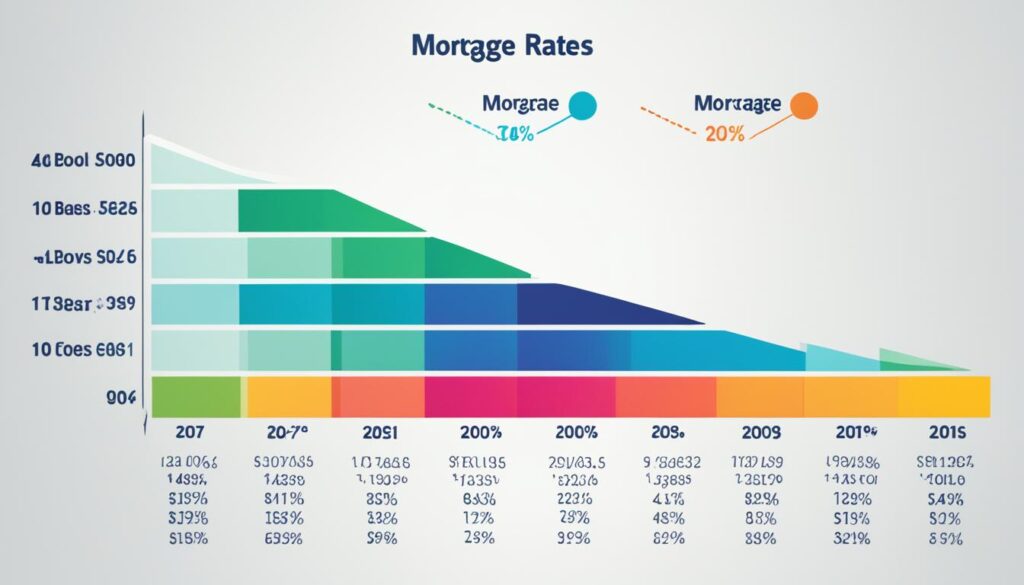In the challenging housing market of 2024, homebuyers are facing high prices, rising mortgage rates, and limited inventory. However, with the right strategies and preparation, navigating the complexities of real estate financing is possible. This article aims to provide smart mortgage tips that will empower homebuyers to make informed decisions and secure their dream home in 2024.
Key Takeaways: Mortgages
- Educate yourself about the dynamics of the housing market, including supply and demand factors that affect pricing and sales pace.
- Be aware of the current mortgage rates and their impact on affordability and monthly payments before finalizing a purchase.
- Improve your homebuying preparation by partnering with a reliable real estate agent, obtaining mortgage preapproval, and focusing on credit score improvement and saving for a down payment.
- Explore different mortgage options and understand the pros and cons of each to find the best fit for your financial situation.
- Be flexible and adaptable in your home search, willing to compromise on certain preferences while ensuring nonnegotiable are met.
By understanding the housing market dynamics, being prepared, and making smart mortgage decisions, homebuyers can overcome the challenges of 2024 and achieve their homeownership dreams.
Understanding the Housing Market Dynamics
In today’s housing market, understanding the dynamics is crucial for homebuyers. The housing market is driven by the forces of supply and demand, which directly impact pricing and the pace of sales.
Over the past few years, the market has seen low supply and high demand, creating a fiercely competitive environment. Multiple offers and bidding wars have become the norm as buyers vie for limited inventory. This scarcity of available homes has driven up prices and is expected to continue in the near future.
One contributing factor to the limited supply is that homeowners with historically low mortgage rates are less likely to sell. This hesitation reduces the number of homes in the market, further intensifying the supply-demand imbalance.
Market Impact:
- Elevated housing prices due to limited inventory
- Competitive market with multiple offers and bidding wars
- Reduced supply of homes for sale
- Increased difficulty for homebuyers to find suitable properties
When entering the housing market in 2024, it is essential to have a clear understanding of these dynamics. By being aware of the current conditions, homebuyers can approach their search with realistic expectations and make informed decisions.
Key Factors to Consider:
- Supply and Demand: The balance between available homes and the number of buyers in the market.
- Pricing: The impact of limited inventory on housing prices.
- Sales Pace: The speed at which homes are being bought and sold.
“Understanding the housing market dynamics is essential for homebuyers to navigate the current conditions and make informed decisions.”
Mortgage Rates in the Current Market

One of the key factors that homebuyers need to consider when entering the housing market in 2024 is the current mortgage rates. Mortgage rates have been a hot topic in the homebuying process due to their rapid increase in recent years.
Economic volatility, inflation, and fluctuations in the job market have contributed to higher mortgage interest rates. These increasing rates have made monthly mortgage payments less affordable for buyers, impacting their overall budget and financial planning.
It’s crucial for homebuyers to carefully evaluate the mortgage rates in the current market and consider their budget, savings, and long-term perspective. By conducting thorough research and consulting with mortgage professionals, homebuyers can make informed decisions and choose mortgage options that are affordable and align with their financial goals.
Understanding how mortgage rates impact monthly payments is essential in determining the affordability of a potential home purchase. Higher interest rates can lead to increased monthly mortgage payments, which affect your overall budget and ability to comfortably afford your dream home.
Homebuyers today must consider their budget and assess whether they are financially prepared for the increased mortgage rates. It’s important to strike a balance between your desired monthly payments and the overall affordability of the home.
Additionally, homebuyers can explore strategies such as improving credit scores, increasing their down payment, or considering alternative mortgage options to mitigate the impact of higher mortgage rates. These strategies can help lower the monthly payments, making homeownership more attainable and financially sustainable in the long run.
Mortgage Rates Comparison
| Year | Average 30-Year Fixed Mortgage Rate |
|---|---|
| 2022 | 3.05% |
| 2023 | 3.72% |
| 2024 | 4.3% (as of Q3) |
As shown in the table above, mortgage rates have steadily increased over the past few years. In 2024, the average 30-year fixed mortgage rate reached 4.3% during the third quarter. This increase highlights the importance of considering the impact of mortgage rates on monthly payments and overall affordability when making a home purchase.
By staying informed about current mortgage rates, carefully assessing their budget and financial goals, and exploring different mortgage options, homebuyers can navigate the challenges posed by the current market and make well-informed decisions that align with their needs and aspirations.
Steps for Improved Homebuying Preparation

Preparing for the homebuying process is crucial for success in the competitive 2024 real estate market. Taking strategic steps and partnering with professionals can significantly enhance your chances of finding the perfect home. Here are some key steps to improve your homebuying preparation:
1. Engage a Knowledgeable Real Estate Agent
Working with an experienced real estate agent can make a significant difference in your homebuying journey. A skilled agent will have comprehensive knowledge of the market, access to new listings, and negotiation expertise. They can guide you through the entire process, offering valuable insights and ensuring a smoother transaction.
2. Obtain a Mortgage Preapproval
Before starting your home search, it’s essential to secure a mortgage preapproval. This process involves a thorough evaluation of your financial situation by a preferred lender. A preapproval demonstrates to sellers that you are a serious buyer with the necessary financial resources. It also gives you a clear idea of your budget and helps refine your search criteria.
3. Improve Your Credit Score
A good credit score is vital in obtaining a favorable mortgage rate. Take proactive steps to improve your creditworthiness, such as paying bills on time, reducing credit card balances, and resolving any errors on your credit report. Strengthening your credit profile can lead to better loan terms and save you money in the long run.
4. Save for a Larger Down Payment
A larger down payment not only reduces the amount you need to finance but also demonstrates your financial stability to lenders. Saving diligently and accumulating a substantial down payment can potentially help you secure a more favorable mortgage rate and lower your monthly payments.
“By partnering with a knowledgeable real estate agent, obtaining a mortgage preapproval, improving your credit score, and saving for a larger down payment, you’ll be well-prepared to navigate the competitive 2024 real estate market.”
5. Research First-Time Homebuyer Programs
If you’re a first-time homebuyer, explore available first-time homebuyer programs offered by federal, state, or local authorities. These programs provide financial assistance, down payment assistance, or favorable loan terms to qualified buyers. Understanding and leveraging these programs can make homeownership more attainable.
By following these steps for improved homebuying preparation, you can position yourself as a strong and attractive buyer in the 2024 real estate market. Remember to stay informed, prioritize your needs and financial capabilities, and seek guidance from professionals to increase your chances of finding your dream home.
| Steps for Improved Homebuying Preparation |
|---|
| Engage a Knowledgeable Real Estate Agent |
| Obtain a Mortgage Preapproval |
| Improve Your Credit Score |
| Save for a Larger Down Payment |
| Research First-Time Homebuyer Programs |
Exploring Mortgage Options

When it comes to buying a home in 2024, exploring different mortgage options is crucial to finding the best fit for your financial situation. While the 30-year fixed-rate mortgage has long been popular, there are alternative options worth considering. Adjustable-rate mortgages and government-backed loans can offer lower initial rates and potentially enable you to purchase a more expensive home.
Fixed-rate Mortgage
A fixed-rate mortgage is a type of home loan where the interest rate remains constant for the entire loan term. This means your monthly payments will stay the same throughout the life of the loan, providing stability and predictability. Fixed-rate mortgages are ideal for buyers who prefer a consistent payment amount over the long term and want to plan their finances accordingly. It is a popular choice for homeowners looking for a reliable mortgage option.
Adjustable-rate Mortgage (ARM)
An adjustable-rate mortgage, or ARM, is a mortgage with an interest rate that can fluctuate over time. Typically, ARMs offer a lower initial rate and may be adjusted periodically based on market conditions. Initial lower rates can help buyers qualify for a larger loan or afford a more expensive property. However, it’s important to understand the terms and conditions of the ARM, including how often the rate can change and any potential rate caps or adjustments.
Government-backed Loans
Government-backed loans are mortgage options insured or guaranteed by government entities such as the Federal Housing Administration (FHA), the Veterans Administration (VA), and the Department of Agriculture (USDA). These loans often have more flexible eligibility criteria, lower down payment requirements, and competitive interest rates. They can be particularly beneficial for buyers who have limited funds for a down payment or a lower credit score. Researching and understanding the specific requirements of each government-backed loan program is essential before pursuing this option.
You need to carefully consider your financial goals and situation when choosing a mortgage. Each option has its own advantages and disadvantages, so it’s important to weigh the pros and cons before making a decision.
By exploring different mortgage options, you can find the best fit for your unique circumstances and financial goals. Understanding the differences between fixed-rate mortgages, adjustable-rate mortgages, and government-backed loans enables you to make an informed decision. Consulting with a mortgage professional can provide additional insight and guidance to help you navigate the mortgage landscape.
| Mortgage Option | Interest Rate | Pros | Cons |
|---|---|---|---|
| Fixed-Rate Mortgage | Stays the same for the loan term |
|
|
| Adjustable-Rate Mortgage | Can fluctuate over time |
|
|
| Government-Backed Loans | Competitive rates |
|
|
Flexibility and Adaptability in Home Search

With the current low housing inventory, finding the perfect home that meets all your criteria can be a challenging task. However, as a homebuyer in 2024, it’s important to be flexible and willing to compromise on certain aspects of your ideal home. This doesn’t mean settling for something you don’t want; rather, it’s about distinguishing between flexible preferences and nonnegotiables.
Establishing firm boundaries based on your must-haves ensures that you don’t compromise on your essential requirements. By being adaptable in the home search process, you can enhance your chances of finding a suitable home in a competitive market.
When considering flexibility, think about the features and amenities that you can compromise on without significantly impacting your overall satisfaction and lifestyle. For example, if having a pool is a flexible preference, you might be open to homes without one. On the other hand, nonnegotiables are the key attributes that are essential for your daily life and should not be compromised.
Being open to compromise doesn’t mean settling for something less than what you want. It means being realistic and understanding that in a low inventory market, you might not find a home that ticks all the boxes. Prioritize your nonnegotiables, such as location, number of bedrooms, or the layout, and focus on finding options that meet those requirements.
Remember that flexibility and adaptability don’t mean giving up on your dreams, but rather having a balanced approach to your home search. By keeping an open mind, exploring different neighborhoods, and considering properties that might not initially meet all your preferences, you can increase your chances of finding a home that aligns with your needs and budget.
Being adaptable in the home search process can give you an advantage in a competitive market. Don’t settle for a home that doesn’t meet your essential requirements, but be willing to compromise on certain flexible preferences to find a suitable home.
Understanding the Difference between Must-Haves and Nonnegotiables
When evaluating your home search criteria, it’s important to distinguish between must-haves and nonnegotiables. Must-haves are the features and amenities that you consider essential for your lifestyle and overall satisfaction. Nonnegotiables, on the other hand, are the key attributes that you cannot compromise on and are deal-breakers if not met.
Creating a list of must-haves and nonnegotiables will help you in making informed decisions and narrowing down your options. It will provide clarity while allowing room for flexibility in other areas. For example, if having a backyard for your children to play is a nonnegotiable, you can be more flexible about the size of the kitchen or the number of bathrooms.
By being clear about your nonnegotiables, you can focus your home search on properties that truly meet your essential requirements. This can save you time and ensure that you don’t settle for a home that falls short of your needs. Remember, compromise is about adjusting your flexible preferences, but it’s important not to compromise on what truly matters to you.
Examples of Flexible Preferences and Nonnegotiables
To help you better understand the distinction between flexible preferences and nonnegotiables, here are some examples:
| Flexible Preferences | Nonnegotiables |
|---|---|
| Pool | Number of bedrooms |
| Open floor plan | Location |
| Updated kitchen | Quality of schools |
As you can see, flexible preferences are features or amenities that you can compromise on without significantly impacting your overall satisfaction. Nonnegotiables, on the other hand, are the key attributes that directly affect your day-to-day life and should not be compromised.
When approaching your home search, consider what aspects of your ideal home are flexible preferences and be open to compromise on those. At the same time, make sure to prioritize your nonnegotiables and focus on finding homes that meet those essential requirements.
By maintaining this balance between flexibility and nonnegotiables, you can navigate the low housing inventory market with a strategic and informed approach, increasing your chances of finding a home that fits your needs and preferences.
Timing and Preparedness for Fast-Moving Markets

In a fast-moving market, timing and preparedness are vital for homebuyers. To increase your chances of securing your dream home, it is crucial to act swiftly when the right opportunity arises. Being proactive and well-prepared can put you in a strong position to succeed in a competitive market.
The Importance of Timing the Market
Timing the market is key when it comes to buying a home. In a fast-moving market, desirable properties can be sold within days or even hours of being listed. Keeping a close eye on new listings and staying in touch with your real estate agent can help you stay ahead of the game.
Obtain Preapproval for a Strong Position
One effective way to be prepared is to obtain a mortgage preapproval in advance. With a preapproval in hand, you show sellers that you are a serious and qualified buyer. This gives you a competitive edge and increases your chances of having your offer accepted. By securing preapproval early on, you position yourself as a strong contender in the homebuying process.
Early Preparation and Organization
Early preparation is essential in a fast-moving market. Take the time to gather all necessary documentation, such as tax returns, pay stubs, and bank statements, so that you are ready to proceed when the right opportunity arises. Completing all the necessary paperwork in advance ensures a smoother and faster process when purchasing a home.
By being organized, you avoid delays and potential disappointments. Meticulously organizing your finances, paperwork, and other important details allows for a seamless and timely homebuying experience.
In Summary
“Timing and preparedness are vital in a fast-moving real estate market. By timing your actions, obtaining preapproval, and being prepared and organized, you increase your chances of securing your dream home in a competitive market.”
| Benefits of Timing and Preparedness | Actions to Take |
|---|---|
| Increased chances of securing desired home | Watch for new listings and be proactive |
| Competitive edge over other buyers | Obtain mortgage preapproval in advance |
| Smooth and fast homebuying process | Collect all necessary documentation early |
| Minimize potential delays and disappointments | Stay organized and prepared throughout |
Timing and preparedness can make a significant difference when navigating a fast-moving real estate market. By acting swiftly, obtaining preapproval, and staying organized, you position yourself for success and increase your chances of securing the home of your dreams.
The Impact of Inventory and Market Conditions

Understanding the historical ebb and flow of housing inventory can provide valuable insights into market conditions. Traditionally, inventory levels follow seasonal patterns, influenced by factors such as weather conditions and school schedules. These seasonal inventory patterns directly impact buyer activity and sale trends throughout the year.
However, the recent pandemic has disrupted these patterns and introduced new dynamics into the housing market. Homeowners hesitated to list their properties, leading to reduced inventory in many areas. As a result, buyer activity has intensified, creating a highly competitive market with limited options for potential homebuyers.
While inventory is gradually growing in some markets, affordable areas still face scarcity. This inventory growth is a positive sign but may not be sufficient to meet the increasing buyer demand in 2024. Homebuyers need to be aware of these market conditions and adjust their expectations accordingly.
The Impact of Seasonal Inventory Patterns
Understanding the seasonal inventory patterns and how they affect the housing market is crucial for homebuyers. By analyzing historical data, buyers can anticipate when inventory levels are likely to be higher or lower, and plan their search accordingly.
“Seasonal fluctuations in housing inventory directly impact buyer activity and sale trends. For example, during the spring and summer months, when inventory typically increases, buyer activity tends to be higher, resulting in elevated competition. On the other hand, during the fall and winter months, when inventory decreases, there may be fewer buyers but also less competition.”
By aligning their home search with the seasonal inventory patterns, buyers can strategically position themselves in the market and potentially find better deals and opportunities.
However, it’s important to note that the pandemic has disrupted these patterns, causing inventory levels to deviate from the usual seasonal trends. This unpredictable market dynamic calls for adaptability and flexibility on the part of homebuyers.
The Influence of Buyer Activity and Sale Trends
Buyer activity and sale trends are directly influenced by inventory levels. Limited inventory creates a sense of urgency and drives up competition among buyers. This increased competition can lead to bidding wars and higher sale prices for desirable properties.
On the other hand, when inventory levels are higher, buyers may have more options and bargaining power, potentially leading to more favorable purchase terms and prices.
Understanding these dynamics can help homebuyers navigate the market more effectively and make informed decisions. By staying informed about sale trends and buyer activity in their desired areas, buyers can anticipate the level of competition they may face and adjust their strategies accordingly.
Weighing the Decision to Buy in the Current Market

Deciding whether to buy a home in the current market is a personal decision based on various factors. As home prices continue to rise, affordability becomes a significant concern for potential buyers. However, it’s important to consider the long-term goals and objectives before delaying a purchase.
While the high prices may be discouraging, waiting to enter the market can result in even higher costs down the line. The real estate market is known for its cyclical nature, and delaying a purchase may mean missing out on potential gains in property value.
When evaluating the decision to buy a home, take into account your long-term goals. Homeownership is often seen as a pathway to building wealth and establishing stability. If your long-term goals include owning a property and building equity, it may be worth considering buying now, despite the current market conditions.
Additionally, consider your budget and financial circumstances. While high home prices can impact affordability, low mortgage rates offer an opportunity to secure favorable financing terms. By carefully planning your budget and determining what you can comfortably afford, you can navigate the market more confidently.
It’s essential to stay informed and adopt a strategic approach. Keep a close eye on market trends, interest rates, and inventory levels. Work with a knowledgeable real estate agent who can provide valuable insights and guide you through the buying process.
A strategic approach to homeownership involves weighing the current market conditions against your long-term goals and financial capabilities.
Evaluating Affordability
One key aspect to consider is affordability. The current high home prices can make it challenging to find a property that fits within your budget. However, remember that affordability extends beyond the purchase price. Consider other expenses such as property taxes, insurance, maintenance, and potential renovations.
By carefully evaluating your financial situation and determining what you can comfortably afford in the long term, you can make a more informed decision. A thorough assessment of your current income, savings, and potential future expenses will help determine if now is the right time to buy.
Long-Term Goals and Investment Potential
While the current market may present challenges, it’s essential to keep your long-term goals in mind. Real estate has historically been a sound investment, and buying a home can provide a long-term asset and potential appreciation over time. Property values tend to increase over the long run, and by buying now, you have the potential to benefit from future value growth.
Consider your plans for the future. If you envision yourself staying in the property for an extended period, homeownership can provide stability and the freedom to personalize your living space. If you anticipate moving in the near future, renting may be a more suitable option.
Seeking Professional Advice
Navigating the complexities of the current housing market can be daunting, but seeking professional advice can provide valuable insights. Work closely with a trusted real estate agent who understands the local market and can guide you through the buying process. They can help you evaluate affordability, assess market conditions, and negotiate favorable terms.
Additionally, consider consulting a mortgage advisor who can provide a comprehensive analysis of your financial situation and help you determine the most suitable mortgage options for your needs.
By weighing affordability, long-term goals, and seeking professional advice, you can make an informed decision about purchasing a home in the current market.
Also Read : Low Income Personal Loan Solutions For You
Conclusion
In the face of challenges posed by the 2024 housing market, homebuyers can still achieve the rewarding goal of homeownership with smart mortgage tips and a strategic approach. Navigating the complexities of the housing market requires preparation, realistic expectations, and staying informed.
To successfully navigate the market, partnering with a reputable real estate agent is essential. Their expertise and knowledge will help homebuyers make informed decisions and navigate the intricate details of the homebuying process. Additionally, improving credit scores and exploring various mortgage options can provide buyers with more favorable terms, ensuring long-term affordability.
By remaining resilient and adaptable, homebuyers can overcome the challenges of the housing market. Patience and compromise are important when searching for the perfect home, while still considering non-negotiable factors. Early preparation, obtaining preapproval, and understanding market conditions will put buyers in a strong position to act swiftly and secure their dream home.
Ultimately, homeownership in the 2024 housing market is attainable with the right strategies and a thoughtful approach. By implementing these smart mortgage tips, navigating the housing market becomes a seamless and rewarding process, bringing the long-desired rewards of homeownership.
FAQs
Q: What is a mortgage lender?
A: A mortgage lender is a financial institution or individual that lends money to borrowers for the purpose of purchasing a home or refinancing an existing mortgage.
Q: How can I refinance my mortgage?
A: To refinance your mortgage, you can shop around for lower interest rates, apply for a refinance loan with a lender, and go through the loan approval process.
Q: How can I get a mortgage?
A: To get a mortgage, you need to apply with a mortgage lender, provide financial documents, undergo a credit check, and get pre-approved for a loan amount.
Q: Why is it important to use a mortgage calculator?
A: A mortgage calculator can help you estimate your monthly mortgage payment, compare mortgage rates, and determine how different factors like loan term and interest rate can affect your overall costs.
Q: What are the common types of mortgage loans?
A: Common types of mortgage loans include conventional loans, FHA loans, fixed-rate loans, and government-backed loans like VA loans and USDA loans.
Q: How do mortgage and refinance rates impact my loan?
A: Mortgage and refinance rates determine the cost of borrowing money for a home purchase or refinance, with lower rates resulting in lower monthly payments and overall interest costs.
Q: What are some factors that affect my monthly mortgage payment?
A: Factors that affect your monthly mortgage payment include the loan amount, interest rate, loan term, property taxes, homeowners insurance, and private mortgage insurance (if applicable).
Source Links
- https://www.cnet.com/personal-finance/mortgages/advice/buying-a-home-in-2024-real-tips-from-a-real-estate-agent/
- https://mortgagesolutions.net/2024/02/28/tips-buying-your-first-house-2024/
- https://www.nerdwallet.com/article/mortgages/buying-a-house-in-2024